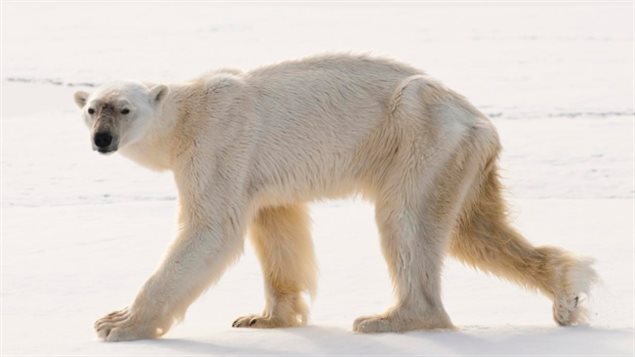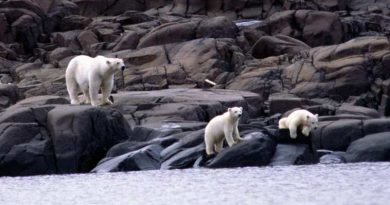Guide sees record-long polar bear dive

(Courtesy Rinie van Meurs)
A guide in Norway’s Svalbard Islands saw an emaciated polar bear stay underwater for a very long time to stalk a bearded seal.
Rinie van Meurs knew it was highly unusual and sent two videos of the event to Canadian polar bear researcher Ian Stirling. After careful analysis, the two wrote a paper called“Longest Recorded Underwater Dive by a Polar Bear” published in Polar Biology.
In one video, the bear is seen swimming in open water. Normally, it would sneak up behind the seal using ice for cover. But it this case it didn’t have the opportunity. Instead, the bear went underwater and swam toward the first of three bearded seals on ice some distance apart from each other.
To listen to the conversation between Radio Canada International’s Lynn Desjardins and biologist Ian Stirling of the University of Alberta, listen HERE
‘Such an unusual observation’
One seal quickly dove into the water, where, being faster than the bear, it could escape. Instead of coming up to look around, the bear stayed underwater for a total of three minutes and ten seconds, then burst out of the water and tried to grab a second seal by the flipper. The seal got away.
“It is such an unusual observation,” says biologist Ian Stirling of the University of Alberta. “That said, it’s probably a relatively common sort of event that the bears dive for these long periods of time. This is very likely close to the maximum for a polar bear to be under water, although there’s no way of knowing that.”
Long dives may be linked to climate change
Van Meurs is concerned that the record-breaking dive may have to do with the melting ice in arctic regions. Polar bears need to use ice to catch their prey, either by stalking it from the ice, or by leaping onto ice where it may be resting.
In this case, Van Meurs says the bear was “very, very skinny” and may have been pushing the limits of its diving capabilities to try to survive. He thinks the long dive indicates bears are trying to adapt to the realities of climate change, and they may be losing.
‘Big changes in the Arctic’
“We’ve seen some very big changes in the Arctic,” says Stirling. “The amount of ice that remains in thepolar basin in the period that it at its minimum—which is about the end of the summer, early September or so—has declined more than 50 per cent in the last 30 years. That’s huge.
“We know that these bears are doing much longer independent swims from place to place. The longest recorded was 11 days at sea swimming.
“So we know that these bears are going to be using these diving abilities more and more while they’re hunting…I think it will help them as long as there’s some ice. If they lose the ice completely, then there’s not very much they can do.”
Related stories from around the North:
Canada: Nunavut Canada community revives eiderdown business, Eye on the Arctic
Finland: Up to 500 reindeer killed annually by trains – no fences planned, Yle News
Greenland: Greenland sled dogs share DNA with today’s canine companions, Radio Sweden
Sweden: High-speed train kills 54 reindeer in Arctic Sweden, Radio Sweden
United States: Grim outlook for Arctic wildlife in oil spill, Alaska Dispatch News



